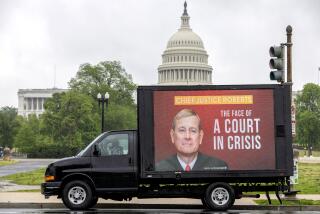GOVERNMENT WATCH : Marshall Plan
- Share via
The agreement by which the late Supreme Court Justice Thurgood Marshall donated his papers to the Library of Congress stipulates that after his death “the collection shall be made available to the public at the discretion of the library.” Librarian of Congess James H. Billington, basing his decision partly on a personal meeting with Marshall, has opened the papers. Cecilia Marshall, the justice’s widow, claims that her husband did not expect the papers to be opened during the lifetime of any justice with whom he had served. Chief Justice William H. Rehnquist objects that the librarian has compromised the confidentiality of the court.
Since the weight of evidence as to Marshall’s intent clearly rests with Billington, the real difference of opinion is between Marshall, from beyond the grave, and Rehnquist. Past justices have imposed longer delays on the release of their papers than Marshall did. Future justices will probably do so as well. But there may be a reason why the first African-American justice in the history of the court chose to make himself, once again, an exception.
Laws are not made by angels but by human beings, and human beings are prey not just to prejudice but to endless other limitations of mind and character. Marshall, no less than Rehnquist, valued the privacy of the court, but for easily imaginable reasons, he may have wanted the veil, just for a moment, to lift. The unveiled court, it turns out, is a modest credit to the country. Modest, not august; a credit, not a glory. We take this as Justice Thurgood Marshall’s final opinion, and we concur.
More to Read
Sign up for Essential California
The most important California stories and recommendations in your inbox every morning.
You may occasionally receive promotional content from the Los Angeles Times.










